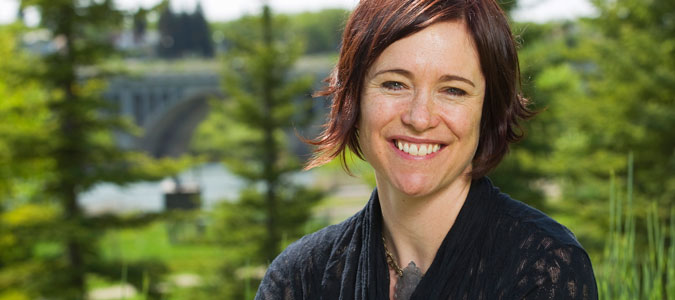Sustainability through education
Sustainability is a hot topic, but there is often a difference between an organization’s sustainability policy and practice. Aiming to help an organization’s practice match its policy is one of the areas to be studied in the newly launched Sustainability Education Research Institute (SERI) at the U of S.
By Kris Foster The institute, the first of its kind in Canada, will include an online hub for collaborative research, as well as a physical hub for in-person work. This new infrastructure, explained Marcia McKenzie the institute's director, will enable faculty, graduate students and community partners to work together on environmental sustainability issues in relation to social and economic priorities in five broad areas including research, education, governance, operations and community outreach.
The institute, the first of its kind in Canada, will include an online hub for collaborative research, as well as a physical hub for in-person work. This new infrastructure, explained Marcia McKenzie the institute's director, will enable faculty, graduate students and community partners to work together on environmental sustainability issues in relation to social and economic priorities in five broad areas including research, education, governance, operations and community outreach.Among the projects to be housed in SERI is the Sustainability and Education Policy Network (SEPN),which is a $3-million grant funded by the Social Sciences and Humanities Research Council. SEPN is made up of 30 researchers from across Canada—including five from the U of S in the College of Education, the Department of Geography and Planning, and the School of Environment and Sustainability—and 11 organizations from around the world, such as the David Suzuki Foundation, the Association for the Advancement of Sustainability in Higher Education and the Assembly of First Nations.
"Greenwashing, for example, is an area SEPN is concerned with. This means labelling yourself as green or environmentally sustainable but beyond a surface level, carrying out business as usual. Through analysis and research on policy and practice, we can work with educational institutions to address this gap and create a more sustainable future," said McKenzie, an associate professor in the College of Education where SERI is housed.
Members within SERI will also be working in consultation with partners in Saskatoon— including the City of Saskatoon, the Saskatoon Public School Division and the Saskatoon Catholic School Division—on Education for Sustainable Development initiatives. Other SERI projects include a participatory research digital media project on sustainability issues important to youth, and contributions to community initiatives such as the Saskatoon CarShare Co-operative.
"It matters because the path we are on as a country and globally is not environmentally sustainable," explained McKenzie. "With SERI we have space for educational institutions, government, and non- government and community groups to come together and engage with environmental issues like climate change on a deeper level."
Through partnerships, research and education, McKenzie hopes the institute can help address the denial of environmental issues. "Denial of climate change has been on the rise over the past decade," said McKenzie. "There is dissonance between how we are used to living and the change we need to make. We may be making the planet unlivable for future generations, but we don't want to change the ways we've grown accustomed to doing things, so we either deny or ignore the realities of the issue."
To that end, McKenzie said that environmental protection needs to become as much a priority as economic gains, and will require "involvement from grassroots to policy makers so that we can work on solutions at all levels."

